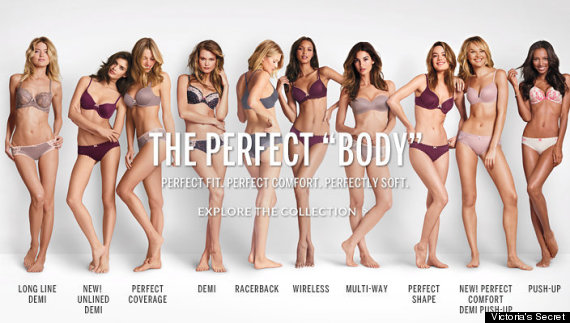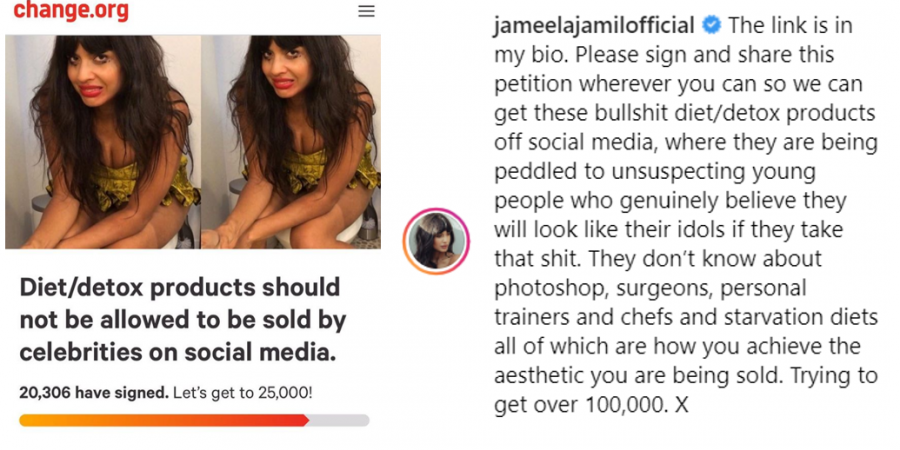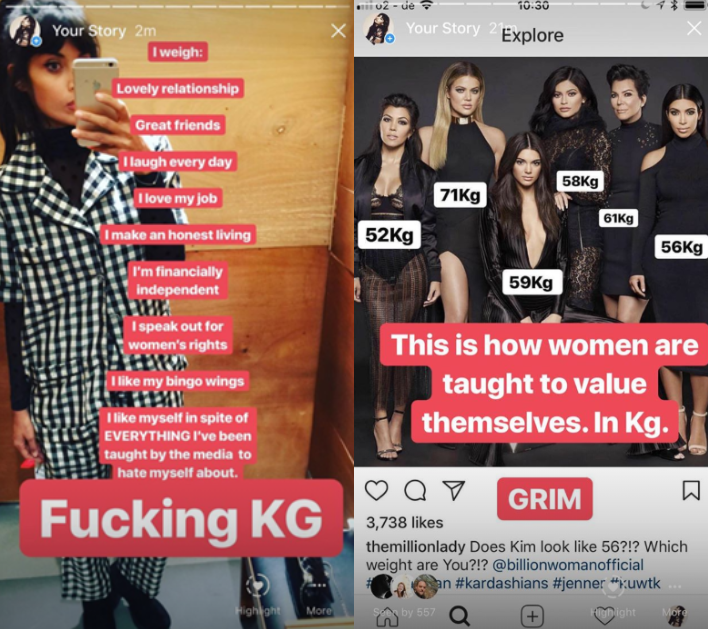
Jameela Jamil's 'I Weigh' movement and its weight on society
With platforms like Instagram gaining more and more popularity among young(er) users, the pressure to look perfect also gets bigger and bigger. Everyone looks to celebrities for guidance and that gives them the responsibility to set an example. Some well-known figures abuse this influence while others take this duty more seriously.
In this article, we want to explain what body positivity is, what the actress Jameela Jamil has to say about today’s beauty standards with her social movement 'I Weigh' and how the work of French philosopher Michel Foucault can help us understand this.
Jameela Jamil
Jameela Alia Burton-Jamil, born in London in 1986, is a British actress, model, presenter, and activist. She is mostly known from her role as Tahani Al-Jamil in the Golden Globe-nominated American television series The Good Place. Jameela Jamil’s activism is mostly based on the online crusade for body positivity. In March 2018, she launched an Instagram account called I Weigh, as 'a movement… for us to feel valuable and see how amazing we are, and look past the flesh on our bones.'
Next to this, the actress often comments on celebrities and platforms that promote unrealistic beauty and body-size standards. The Kardashian sisters are often the victims of Jamil’s public criticism. The Kardashians make extra money promoting questionable products on social media that suppress your appetite or replace your meals. Jamil recently went viral for leaving this comment on a sponsored post that Khloe Kardashian shared, promoting 'Flat Tummy shakes'.
Figure 1: Jamil’s reaction to Kardashian’s Instagram post
Kardashian responded to this saying that she’s never had a chef and she knows that not everyone can afford a personal trainer. Jamil, however, did not accept this statement and tweeted what she got from the response of Khloe Kardashian: 'Essentially, 'fuck the young, impressionable people, or those struggling with eating disorders, we want the money.' I have been given these same opportunities to flog this stuff, and I don’t do it, so they don’t have to. Thank you, next.' Jamil has also publicly criticized the Kardashian sisters for being a 'terrible and toxic influence on young girls.'
In an action in line with her critical comments on diet shakes and eating suppressant products, in February 2019 Jamil created a petition on Change.org, a website that facilitates petitions by the general public. In this petition, she urged celebrities to stop promoting toxic diet products on social media.
.
Figure 2: Jamil’s Change.org petition
On Change.org, Jamil states that these weight-loss products rely on naive customers who are not aware that these items rarely have any science behind them and that they have a negative effect on body image. Ten weeks after creating the petition, it has received approximately 240,000 signatures. Jamil hopes this will prove to social platforms that there’s a powerful community of users who no longer want to see weight-loss products being promoted.
Body positivity
Body Positivity is a concept which has gained much traction in the last few years, and with that, it has developed quite a bit. The most relevant definition of this large-scale social movement is the idea of learning to accept one’s own body and the changes it may undergo. It is the understanding that what goes on in the body, and the judgment we pass on it, are two separate entities — that no matter what is happening inside, outside everyone is still worthwhile.
Contrary to what it might seem like at first glance, body positivity is about more than just weight (e.g., it's also about skin color and disabilities), and, while it focuses on women, people of all genders are included. The toxic notion of body image, which is still the norm even with the ever-rising popularity of the body positivity movement, is predominantly perpetrated by 'the media.'
Correctly and inclusively portraying bodies is key to creating a healthy and happy social environment, which is why the activism of people like Jameela Jamil is of vital importance.
This state of affairs can be better understood through the lens of Foucault's theory. As Foucault described, the modern obsession with the fit, thin and healthy body (three concepts which have now almost become synonymous), are a result of the creation of two types of discourse (Pylypa, 1998).
The first is a health discourse, based on knowledge from the medical profession, but also on knowledge from the popular discourse on health, which has taken on a more scientific tone.
The second discourse, which is more relevant to this article, is a product of the media and the advertising industry. This is where the modern set of norms for an ideal body is formed. It is here that a thin body is portrayed as the ideal body: healthy, beautiful, and sexy. The opposite of this, an unfit body, has acquired the image of being ugly, unsexy, and unpopular.
The perpetration of this problematic discourse has been the root of body image issues for many years now, and the body positivity movement aims to put a stop to exactly this. But because of the massive amounts of traction the movement has gained, companies see it as a grand advertising opportunity, leading to it often being exploited.
Take for example Victoria’s Secret 'The Perfect Body' body positivity campaign. It aimed to be inclusive and body-positive but failed miserably in doing so. However, with social awareness being heightened by social media as it is today, consumers were quick to call the company out, setting a standard for any future campaigns. Correctly and inclusively portraying bodies is key to creating a healthy and happy social environment, which is why the activism of people like Jameela Jamil is of vital importance.

Figure 3: Victoria’s Secret ‘The perfect Body’ campaign
I Weigh
Jameela Jamil started the I Weigh Instagram account after being outraged by an Instagram post showing the Kardashians and Jenners along with their weight. These women were being reduced to numbers through the display of only how much they weigh and not any of the other many attributes that define them. When asked about this in an interview, Jamil responded with 'If there are any numbers written across those women’s bodies, it’s how much money they have brought to the table, which is a significant amount.' She also noted that there would never be a photo of a group of men with their weight written on them. On social media, Jamil responded to the photo in question by posting a picture of herself, telling us what she weighs in everything else but kilograms.
This is the format that the I Weigh Instagram account follows. It features people writing down their attributes to show that this is what they weigh, such as 'a good friend,' 'honesty,' 'risk taker.' Instead of focusing on the flesh on our bodies, Jameela focuses on all the other things a human is. In an Instagram story, she describes I Weigh like this: 'It’s for us to feel valuable and see how amazing we are, and look beyond the flesh on our bones.' Through this social media account, she is trying to change the way people view and judge themselves. She is an advocate for a different set of norms when it comes to our bodies. Being 'thin' should not be the pinnacle of beauty, health, and attraction.
Figure 4 & 5: Jamil’s Instagram story response to Kardashian photo
In theoretical terms, Foucault stresses the importance of resistance and claims that resistance exists where there is normalization and domination. King applies this idea to feminism (King, 2004). She discusses this in the context of women who are not conforming to the normative ideals of femininity. This idea of resistance can also be applied to Jameela Jamil's advocacy since she is building resistance against body negativity. Since she started the movement in March of 2018, she has gained 666,000 followers as of April 2019. This huge following can definitely be seen as a start or a contribution to the resistance against toxic ideals.
Jamil is trying to create a platform where everyone can express themselves. However, there are people who are saying that she is ‘too pretty’ and ‘too thin’ to be a body positivity advocate. She is being accused of attacking fellow famous women while also presenting herself in professional photos on her personal Instagram account, where she shares photos from professional photoshoots.
However, Jamil also portrays herself without make-up. Jamil is taking action with I Weigh, and not merely condemning impossible beauty standards. She is trying to make a change. This does not mean that she is the be-all and end-all of body positivity. She calls herself a feminist-in-progress and has admitted on multiple occasions that she was wrong or made a mistake. She recently tweeted' Tahani here is me entering a twitter argument without knowing all the facts, quietly deleting my tweet and backing back out to go and learn...,' acknowledging that an instance of her online behavior was wrong. Tweets like this show that she is willing to admit that she makes mistakes and sometimes needs to educate herself more. She knows she is not perfect, but she is trying her best and maybe that is part of the reason why she has gained so much popularity.
Jameela Jamil and her influence
In conclusion, Jameela Jamil has been a great contribution to the body positivity movement. However, there are a lot of strides that still need to made for the I Weigh movement to fully succeed. That being said, movements and influencers like this are of the utmost importance to ensure that we can develop an inclusive and progressive social space, where everyone can live happily and healthily. Jamil’s efforts in which she continues to call out celebrities on perpetrating an unrealistic and unattainable standard are an important first step to defining and setting a realistic image for our bodies that everyone in society can relate to.
However, Jamil cannot be seen as the perfect role model, something she knows about herself as well. Movements are exactly what their name suggests: a moving and relevant discussion that raises awareness for important social issues, so that this world might become a better place to live in. This is exactly what I Weigh does, and is thereby an important movement that deserves continuous support.
References
Bahadur, N. (2014, Nov. 6). Victoria’s Secret ‘Perfect Body’ Campaign Changes Slogan After Backlash. HuffPost.
Boan, D. (2019, Mar. 21). Jameela Jamil Has a Scathing Response to Khloe Kardashian Promoting Weight-Loss Shakes on Instagram: 'Be Smarter Than This'. Business Insider.
Brown University - Internalized Authority and the Prison of the Mind: Bentham and Foucault's Panopticon.
King, A. (2004). The Prisoner of Gender: Foucault and the Disciplining of the Female Body. Journal of International Women's Studies, 5(2), 29-39.
McMullan, T. (2015, July 23). What does the panopticon mean in the age of digital surveillance?
Pylypa, J. (1998). Power and Bodily Practice: Applying the Work of Foucault to and Anthropology of the Body. Arizona Anthropologist, 13, 21-36.
Schreiber, K. & Hausenblas, H. (2016, Aug. 11). What Does Body Positivity Actually Mean? How (and why) the concept continues to be misunderstood. Psychology Today.
YouTube - Jameela Jamil’s “I Weigh” Encourages Women’s Self-Worth

